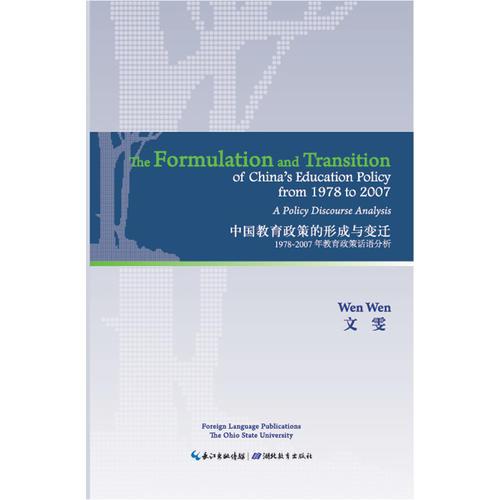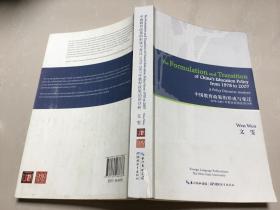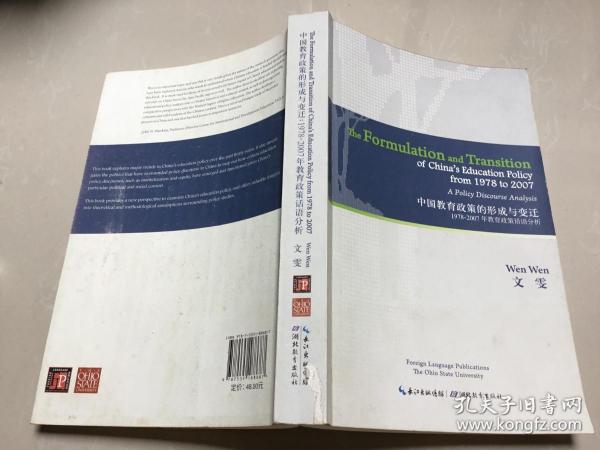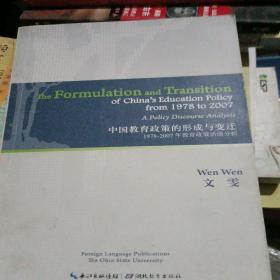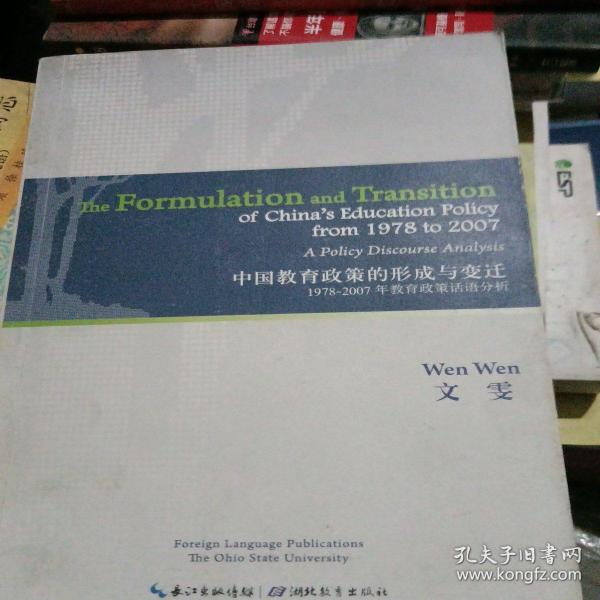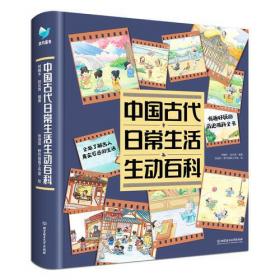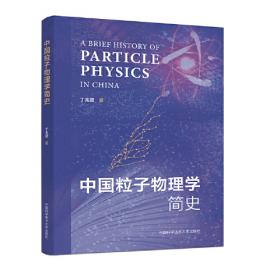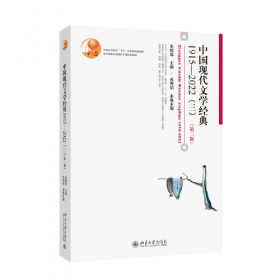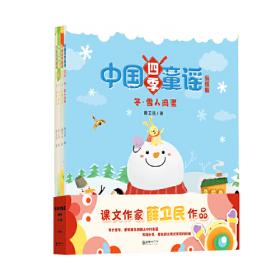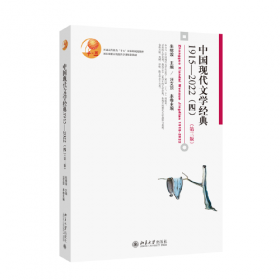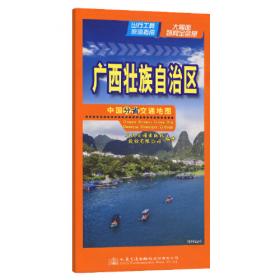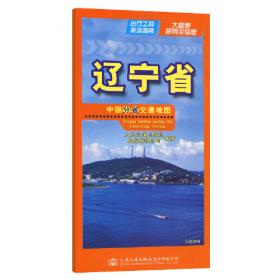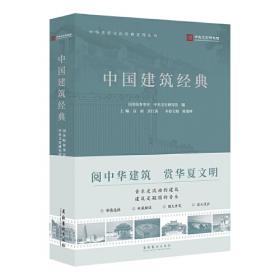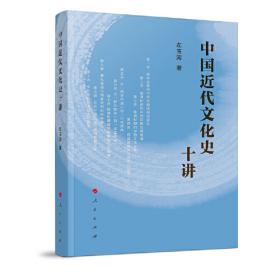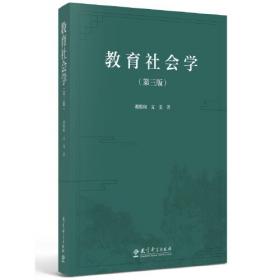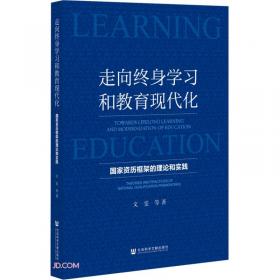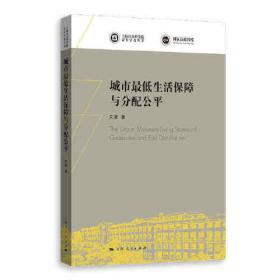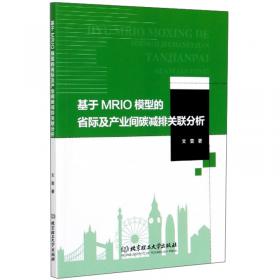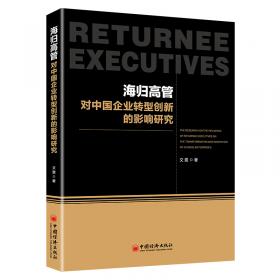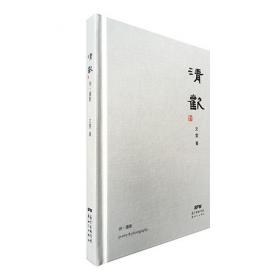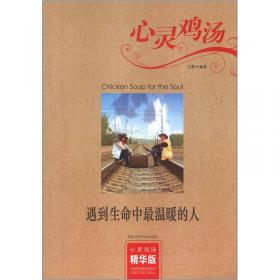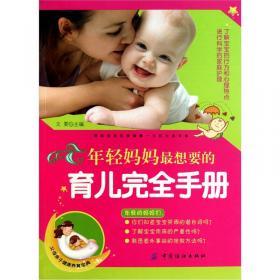中国教育政策的形成与变迁——1978-2007的教育政策话语分析 (The Formulation and Transition of China's Education Policy from 1978 to 2007)
出版时间:
2013-05
版次:
1
ISBN:
9787535188687
定价:
48.00
装帧:
平装
开本:
16开
纸张:
胶版纸
页数:
279页
18人买过
-
本书从政策角度深入分析了中国教育在过去30年中的改革和发展状况,全面描绘了中国教育政策的变化和发展规律,归纳出教育政策的四种类型,并分析了不同类型政策生成的资源和机制。本书结合中国教育政策的特点和中国的语言文化特点,将流行于西方社会科学和语言学领域的批判性话语分析(CDA)方法应用到中国教育政策分析中,这不仅在教育学和语言学方法论上是一次创新,在教育政策研究范式上也有重要的贡献。 文雯博士,清华大学教育研究院讲师,青年学者,主要研究方向为教育基本理论、国际与比较教育、批判性话语分析。清华大学文学学士和管理学硕士,牛津大学教育学博士。
她与导师谢维和教授合著出版的2本教育理论著作《中国高等教育大众化过程中的结构分析:1998-2004的实证研究》、《中国的教育公平与教育发展——关于教育公平的一种新的理论假设及其初步证明(1990-2005)》在国内外教育研究领域获得较大的反响和关注。
此专著基于她2006-2010年在牛津大学教育系攻读博士期间的研究成果,开拓了批判性话语分析(CDA)在教育政策分析中的实践与应用。 SUMMARY
ACKNOWLEDGEMENT
CHAPTER ONE: Introduction
1.1 Nature of the research
1.2 Researchquestions
1.3 Organization and scope of the book
CHAPTER TWO: Theoretical Framework
2.1 Introduction
2.2 The past and present of education
policy studies
2.3 Policy discourse matters
2.4 Discourse theories in policy
analysis
2.5 Deconstructing policy documents:
Application of
discourse theories to thisstudy
2.6 Effects of policy discourse: A discourse-resource
mode
2.7 Conclusion
CHAPTER THREE: Methodology
3.1 Introduction
3.2 Rationale of policy analyses
3.3 Data sources
3.4 Access and gatekeeping
3.5 Documentary research
3.6 Content analysis as an approach
3.7 Discourse analysis as an approach
3.8 Language and translatability
3.9 Conclusion
CHAPTER FOUR: Background to China’s
Education Reform and Policy Changes
4.1 Introduction
4.2 From collectivism to dynamic
ideology
4.3 Political system in China
4.4 Chinese economy
4.5 Economic reforms
4.6 China’s education system
4.7 Brief history of the development of
the education system from 1978 to 2007 from the perspective of policy
changes
4.8 Conclusion
CHAPTER FIVE: Exploring Policy Texts:
Trends and Types of Education Policy in China
5.1Introduction
5.2 Data sources
5.3 The application of content analysis
5.4 Trends of education policy
5.5 Typology of China’s
education policy
5.6 Conclusion
CHAPTER SIX: Exploring Intertextuality:
Public Discourse and Elite Discourse
6.1 Introduction
6.2 Rationale and data source
6.3 Public discourse on China’s
education – Letters of complaint
6.4 Elite’s discourse on China’s
education - Proposals of members of the Chinese People’s Political Consultative
Conference (CPPCC)
6.5 Transitions in discourse, from the
grass-root to the elite level: Implications for theeducation policy process in China
CHAPTER SEVEN: Exploring Policy
Discourse: ConceptualizingMarketization and ConstructingDifference in Equity
7.1 Introduction
7.2 Rationale of discourse and data
source
7.3 Conceptualizing the marketization
of education in
China
7.4 Constructing differences in equity
policy
7.5 Conclusion
CHAPTER EIGHT: A Discourse-Resource
Model to Explain the Effects of Education Policy
8.1 Introduction
8.2 Rationale of the discourse-resource
model
8.3 Policy discourse as regulative
resources
8.4 Policy discourse as cognitive
resources
-
内容简介:
本书从政策角度深入分析了中国教育在过去30年中的改革和发展状况,全面描绘了中国教育政策的变化和发展规律,归纳出教育政策的四种类型,并分析了不同类型政策生成的资源和机制。本书结合中国教育政策的特点和中国的语言文化特点,将流行于西方社会科学和语言学领域的批判性话语分析(CDA)方法应用到中国教育政策分析中,这不仅在教育学和语言学方法论上是一次创新,在教育政策研究范式上也有重要的贡献。
-
作者简介:
文雯博士,清华大学教育研究院讲师,青年学者,主要研究方向为教育基本理论、国际与比较教育、批判性话语分析。清华大学文学学士和管理学硕士,牛津大学教育学博士。
她与导师谢维和教授合著出版的2本教育理论著作《中国高等教育大众化过程中的结构分析:1998-2004的实证研究》、《中国的教育公平与教育发展——关于教育公平的一种新的理论假设及其初步证明(1990-2005)》在国内外教育研究领域获得较大的反响和关注。
此专著基于她2006-2010年在牛津大学教育系攻读博士期间的研究成果,开拓了批判性话语分析(CDA)在教育政策分析中的实践与应用。
-
目录:
SUMMARY
ACKNOWLEDGEMENT
CHAPTER ONE: Introduction
1.1 Nature of the research
1.2 Researchquestions
1.3 Organization and scope of the book
CHAPTER TWO: Theoretical Framework
2.1 Introduction
2.2 The past and present of education
policy studies
2.3 Policy discourse matters
2.4 Discourse theories in policy
analysis
2.5 Deconstructing policy documents:
Application of
discourse theories to thisstudy
2.6 Effects of policy discourse: A discourse-resource
mode
2.7 Conclusion
CHAPTER THREE: Methodology
3.1 Introduction
3.2 Rationale of policy analyses
3.3 Data sources
3.4 Access and gatekeeping
3.5 Documentary research
3.6 Content analysis as an approach
3.7 Discourse analysis as an approach
3.8 Language and translatability
3.9 Conclusion
CHAPTER FOUR: Background to China’s
Education Reform and Policy Changes
4.1 Introduction
4.2 From collectivism to dynamic
ideology
4.3 Political system in China
4.4 Chinese economy
4.5 Economic reforms
4.6 China’s education system
4.7 Brief history of the development of
the education system from 1978 to 2007 from the perspective of policy
changes
4.8 Conclusion
CHAPTER FIVE: Exploring Policy Texts:
Trends and Types of Education Policy in China
5.1Introduction
5.2 Data sources
5.3 The application of content analysis
5.4 Trends of education policy
5.5 Typology of China’s
education policy
5.6 Conclusion
CHAPTER SIX: Exploring Intertextuality:
Public Discourse and Elite Discourse
6.1 Introduction
6.2 Rationale and data source
6.3 Public discourse on China’s
education – Letters of complaint
6.4 Elite’s discourse on China’s
education - Proposals of members of the Chinese People’s Political Consultative
Conference (CPPCC)
6.5 Transitions in discourse, from the
grass-root to the elite level: Implications for theeducation policy process in China
CHAPTER SEVEN: Exploring Policy
Discourse: ConceptualizingMarketization and ConstructingDifference in Equity
7.1 Introduction
7.2 Rationale of discourse and data
source
7.3 Conceptualizing the marketization
of education in
China
7.4 Constructing differences in equity
policy
7.5 Conclusion
CHAPTER EIGHT: A Discourse-Resource
Model to Explain the Effects of Education Policy
8.1 Introduction
8.2 Rationale of the discourse-resource
model
8.3 Policy discourse as regulative
resources
8.4 Policy discourse as cognitive
resources
查看详情
-
八五品
湖北省武汉市
平均发货21小时
成功完成率95.89%
-
九品
山东省聊城市
平均发货5小时
成功完成率95.41%

 占位居中
占位居中

